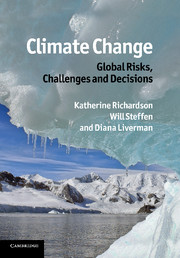Book contents
- Frontmatter
- Contents
- Writing team
- Foreword
- Preface
- List of acronyms and abbreviations
- Part I Climatic trends
- Part II Defining ‘dangerous climate change’
- Part III Equity issues
- Part IV Mitigation and adaptation approaches
- 11 Low-carbon energy technologies as mitigation approaches
- 12 Economic approaches and instruments
- 13 Geopolitics and governance
- 14 Adapting to the unavoidable
- Part V Meeting the challenge
- Index
- Plate section
- References
12 - Economic approaches and instruments
Published online by Cambridge University Press: 04 April 2011
- Frontmatter
- Contents
- Writing team
- Foreword
- Preface
- List of acronyms and abbreviations
- Part I Climatic trends
- Part II Defining ‘dangerous climate change’
- Part III Equity issues
- Part IV Mitigation and adaptation approaches
- 11 Low-carbon energy technologies as mitigation approaches
- 12 Economic approaches and instruments
- 13 Geopolitics and governance
- 14 Adapting to the unavoidable
- Part V Meeting the challenge
- Index
- Plate section
- References
Summary
‘Business-as-usual is dead’
Introduction
Climate change is now understood as a central issue for economic prosperity and development. The Stern Review (Stern et al., 2006) can be seen as the turning point after which climate change has been considered an important economic issue, in addition to being an environmental one. In-depth reviews of the economics of climate change have been conducted for various countries and regions, for example for Australia (Garnaut, 2008) and South-East Asia (Asian Development Bank, 2009), and the development community now sees climate change as one of its main challenges (Chapter 15; World Bank, 2009).
Climate change could affect the fundamentals of economic systems. Meanwhile, curbing greenhouse gas emissions by the extent required to limit the risk of dangerous climate change (e.g. the 2 °C guardrail; Chapter 8) will require comprehensive changes in technologies, energy systems, industrial production practices and locations, and consumption patterns.
Countries will strive to effect such change with the minimum of economic cost; that is, keeping any sacrifices in economic prosperity as small as possible. While it can be argued that excessive consumption is one of the root causes of high greenhouse gas emissions, it is equally clear that few, if any, societies will readily make big cuts to their levels of material well-being. To achieve emissions cuts effectively and efficiently will require sound economic policies, integrated across different sectors of the economy and harmonised with other objectives of economic policy.
- Type
- Chapter
- Information
- Climate Change: Global Risks, Challenges and Decisions , pp. 317 - 343Publisher: Cambridge University PressPrint publication year: 2011

